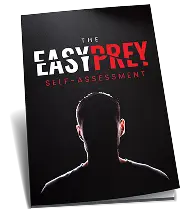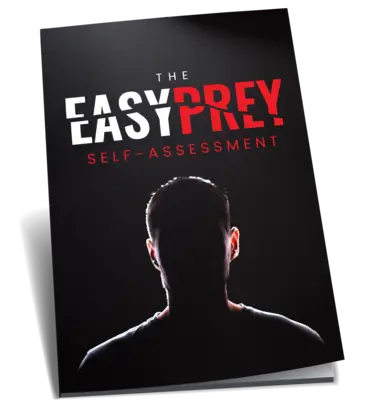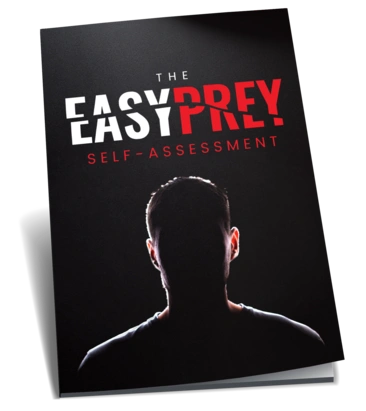You can lower the chance of being a victim of a scam by adopting a few new habits to keep scammers off guard and out of your life.
You think you’re too smart to fall for a scam? Not so fast, because scams come in all sorts of shapes and sizes—and so do their victims.
This year, one out of ten people in the United States will fall victim to fraud and become one of the thousands who lose billions of dollars every year.
In the months (or even weeks!) ahead, you might be targeted and contacted by a scammer when you least expect it and, of course, you won’t be notified in advance that it’s coming.
And that’s what scammers count on…catching you off guard or tricking you into putting your guard down and becoming more vulnerable—for just enough time to pull the wool over your eyes and steal your money.

The wrong way to boost your scam radar.
The best way you could boost your radar for scams is also the worst way:
To get scammed.
Why is it the best way? Because, for sure, you’d likely never let yourself be fooled again! But who wants to learn the hard way? No one!
Here’s a better way.
Develop some sure-fire, effective, and proven anti-scam responses. For example, the next time you get a “great deal,” “super offer,” “dream job,” or “pay up or else!” message by phone, email or text, you'll know how to respond.
We say proven responses because recent research bears it out. The following tips, for example, come direct from their accounts of what happened to former victims.
Following simple, sound advice is good for us.
Some tips that seem too simplistic are usually spot-on and helpful.
Here’s what we mean:
- You tell your children “don’t talk to strangers” for reasons that can save their lives.
- People tell travelers going to foreign countries “don’t drink the water,” to help keep their friends from getting ill.
- And everyone advises a job seeker to “have a firm handshake” and “dress for success” to make a good first impression.
Think of these anti-scam tips below for you and your friends to be just as important. We say that for good reasons:
- Scams are on the rise. Fraudsters aren’t going anywhere and “there’s a new sucker born every minute,” as the saying goes. Con artists still believe that.
- You need to see yourself as potential victim in a dangerous world. You wouldn’t go for a walk in the middle of the night in a strange town—you know better. It’s the same thing walking into dangerous situations digitally.
- As mentioned before, it is much better to learn safety skills now, rather than learn the hard way by getting scammed.
- You will get approached this year (maybe a few times) by a scammer, either directly in person or by phone, or indirectly through a message or ad.
- These are tips you need to teach your entire family. Are you aware that there are specific types of scams for seniors, baby boomers, millennials, teens and even younger children?
Anti-scammers boot camp.
Are you ready to change your thinking and develop some new habits to keep you safe from scammers?
Let’s go!
1. Hang up! Delete! Block! Don’t give strangers a minute of your time.

Does that sound harsh? Is that not like you? It’s hard to imagine being so strict with rules or responses, but keep this in mind: There is nothing that says you need to engage with anyone or any message that you did not initiate.
There are thousands of people who follow this general advice and they all have this one thing in common:
They won’t get scammed anytime soon…if ever at all.
Scams and Fraud. 8 Clever Ways to Avoid Them! #HowScamsWork Share on X2. Trust your instincts. Flee the second something just doesn’t seem right.

That’s a good analogy for us, because there are scammers lurking nearby who approach us with innocent sounding words or suggestions.
You may find yourself lending an ear for a minute or two to a caller, or intently reading an email, or responding to a job offer online. And for a few minutes everything may seem perfectly normal to you.
Until…you hear or read something that just seems a little out of the ordinary.
Trust your instincts and bring everything to a screeching halt. Your instincts are trying to warn you, just like the gazelle who gets a whiff of danger. Run!
3. Be more skeptical.

However….
Many people do get scammed because they lend an ear to callers or read emails diligently and carefully: maybe simply because they haven’t been scammed before. And besides, they like to give everyone a measure of respect and the benefit of the doubt.
Although that’s an admirable sentiment, you simply can’t afford to be that trusting in this day and age.
For example, there’s a term called social engineering that you should know about.
Social engineering involves a con artist acquiring information about you (personal or work-related) and developing a quick profile of your home life or work life. From there, they use that little (but accurate and convincing) information to trick you into some kind of fraud to steal either your (or your employer’s) money.
Therefore, when someone sends you an email, claiming to be your boss or coworker, and tells you to send a Mr. Jones in New York the company credit card number, YOU NEED TO BE VERY SKEPTICAL.
Just because a stranger is polite doesn’t mean they’re honest. This is very important piece of advice to share with senior citizens, who are part of generation where politeness goes a long way. That’s something scam artists know very well.
4. Research the person or organization.

Take your time to research organizations and double verify the information you’re told. Don’t let yourself be fooled simply because a group has an impressive website with professional photographs and a list of testimonials. Use the entire internet to get at the truth and donate only after you’re convinced your money will wind up in reliable hands.
5. Talk to a friend!

But by reaching out to a friend, you avoid making a rash decision. You also might simply destroy what could be a scam altogether—because friends don’t let friends get scammed!
This is good advice in many areas of life, from investing or buying a used car to getting married. Be patient and don’t rush an important decision. That’s what friends are for.
6. Don’t be bullied!

This trick works more often than you think, especially if the scammer reaches a target who might be behind on their taxes or simply has a guilty conscience.
Take note! A bullying caller or threatening letter is a clear indication of a scam in the works. Don’t let that first wave of fear trick you into responding to their demands. Hang up on any caller who uses threats and fear. Then call a friend…and the authorities.
7. Just say “no!”

Just say “no,” “no thanks,” “not interested,” or even “good luck with your efforts…good bye!” End the conversation and step away. You have every right to do so, even if a caller is NOT a scammer.
If you gave every telemarketer your time and ear, you’d waste a lot of minutes, buy services you don’t need. Worse than that, you might get talked into a well-designed scam.
8. Follow the Easy Prey podcast.
Keep learning about scams! Finally, there’s one more habit and routine you can adopt that could fine-tune your scam-radar and keep you from becoming a victim: simply keep up to date is to listen to the Easy Prey Podcast, hosted by Chris Parker.
The Easy Prey Podcast features interesting, entertaining and insightful content. Ranging from interviews, talk and tidbits on how you can stay safe in today’s world.
The more you can learn about scams—how they work; the latest types, the warning signs—the better prepared you are to kick into gear with your new-found scam-savvy skills to stay out of the clutches of fraudsters.
Get notified of the new podcasts.
You can sign up for Easy Prey Podcast alerts (below). That way, you can be notified anytime a new podcast is available or when important new content is posted on the EasyPrey.com website.
You can find the Easy Prey podcast on iTunes, Google Play and other media player platforms.
Listen to the Easy Prey podcasts.
The more you know, the safer you are.







